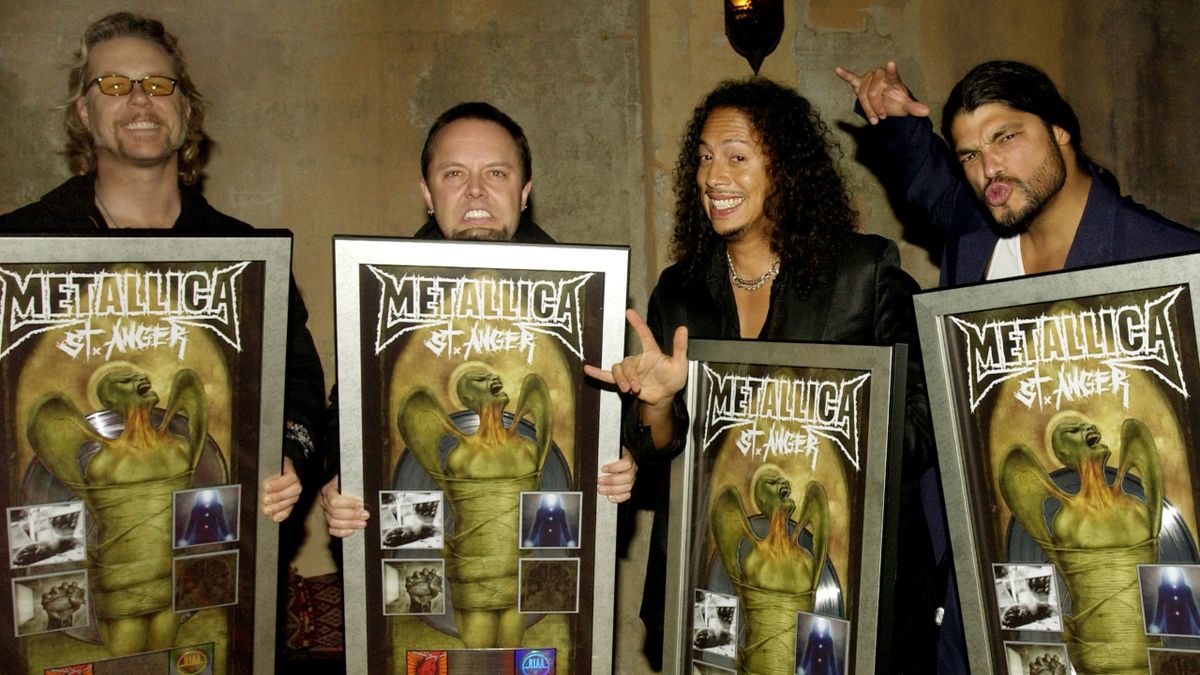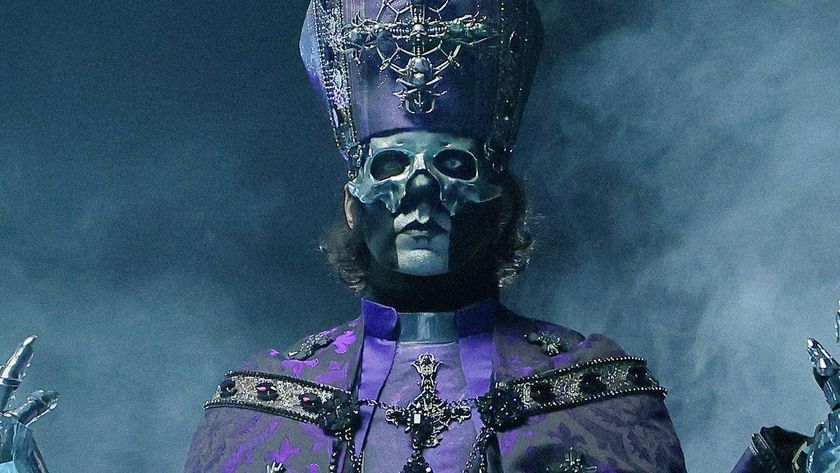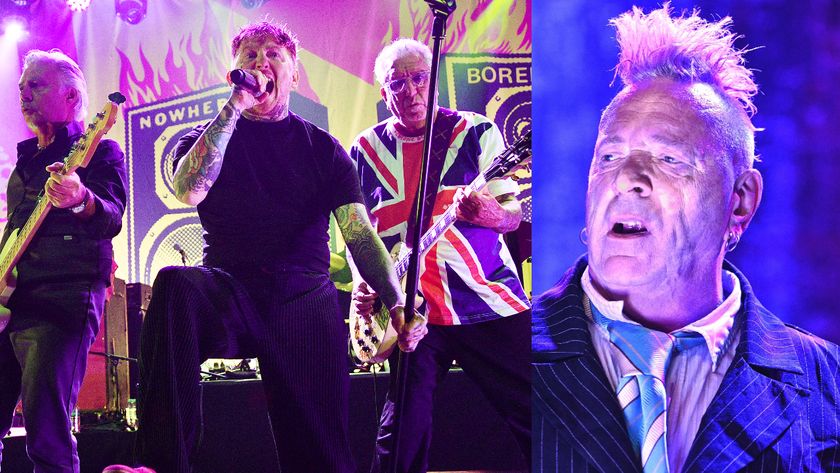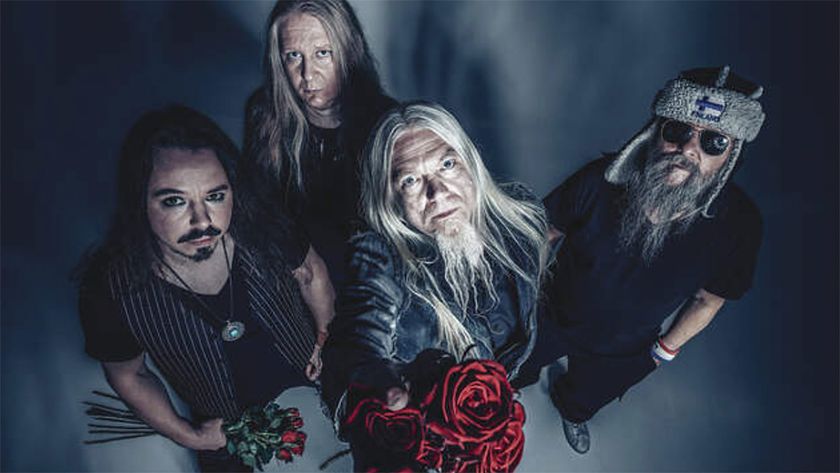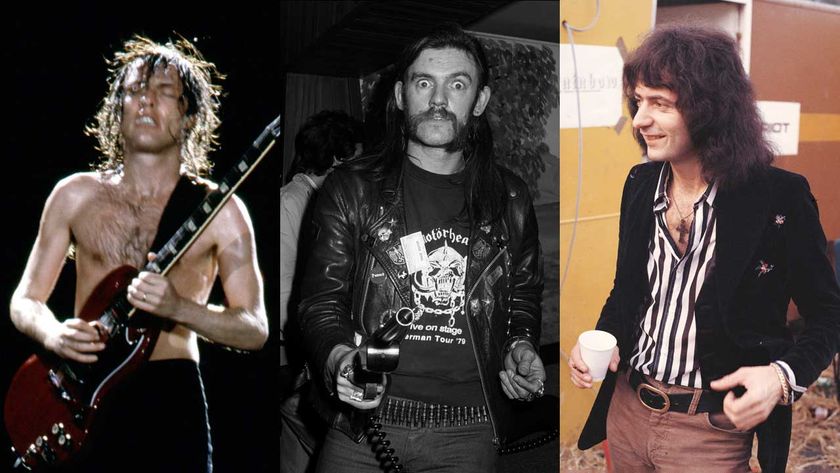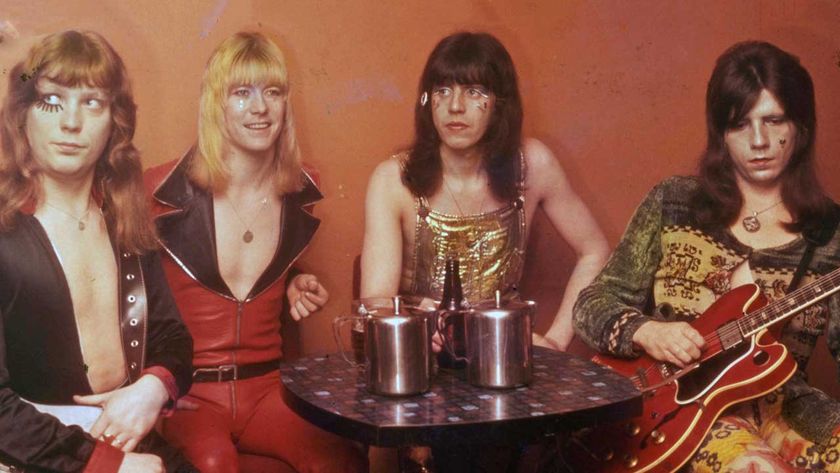You all know the deal with Metallica: in 2003, they were the biggest band on the planet – having taken internet file-share giants Napster to the brink of bankruptcy and changed bass players without breaking sweat – and were enjoying the enormous rewards of yet another international Number One hit album with the brutally uncompromising St Anger.
Or, at least you think you know the deal.
To their unwaveringly loyal fan base, Metallica ideally define blue-collar metal’s strictly defined ideal of manhood: four testosterone-steeped backwoods carnivores, unrefined hell-raisers who drink, fight, fornicate, invariably grit their teeth at cameras and toy with high-calibre weaponry.
It’s a demanding benchmark, but one that the band have been almost duty-bound to live up to. After all, it’s right there in their job description. Metallica aren’t just rock stars, they’re heavy metal stars. Consequently, weakness, sensitivity and living their lives at anything less than 11 simply wasn't an option that was available to them as the new millennium crept into view.
At bottom, Metallica were expected to blaze a trail of abject over-indulgence, because they owed it to the innumerable army of regular Joes who’d invested their rock dollar in Metallica product, be it Enter Sandman or a Pushead-designed tour shirt, so that they could live a vicarious life of wickedness-by-association via Metallica.
That's a hell of a lot of pressure for a band member to bear – and impossible to bear indefinitely. So, in 2001, the dam broke. Metallica's camp was flooded with turmoil.
It all began with the departure of beleaguered bassist Jason Newsted. Having been frozen out of the group creatively and treated as little more than a stand-in despite his 14-year tenure, he quit the band amid hushed allegations of bullying and mistreatment ("He was never really fully accepted into the band", said drummer Lars Ulrich, "in a way he sacrificed himself – or had to be sacrificed – in order for us to be able to move to the place we’re at now.")
Newsted's leaving had a surprisingly profound effect on the rest of the band members. Frontman James Hetfield entered into an eight-month programme of rehab (“a nice little cocoon”, as he would call it), the band enlisted the assistance of a ‘performance therapist’ (“positive energy is so important” Kirk Hammett enthused) and the group were brought back together, closer than ever.
Metallica had grown. The album that followed was an opportunity for them to exhibit their new-found sensitivity.
At the turn of the millennium, Metallica were hoping to enjoy a little well-earned rest and recuperation. The previous summer they had completed a gruelling three-month tour and recorded S&M, an ambitious collaborative project with celebrated classical composer Michael Kamen and the San Francisco Symphony Orchestra that presented a selection of their best-known recordings rearranged in an orchestral setting.
Then Ulrich hand-delivered a list of 317,377 internet users who, it was claimed, had illegally traded Metallica MP3s via popular internet file-share website Napster, to the company’s San Mateo headquarters. Not only were Metallica painted in some quarters as the greed-driven villains of the piece, but they were also ultimately sidelined into soul-sapping litigation for months.
“After S&M we were supposed to have a certain amount of time off,” said Hetfield. “Then Napster went on forever, especially for Lars. Then, after that we did a few shows and the vibe with Jason started to get really bad. During the last couple of tours he was totally withdrawing from everything. Going into his own little world, wearing headphones all the time, never communicating, and we certainly weren’t kings of communication, either. We were just four guys who would shut up, play and let the beast roll on.”
We spoke to Hetfield about the turmoil in 2003. Here's what he had to say.
Do you feel that the experience of going through rehabilitation was something that was essential for the continued existence of Metallica?
“Definitely. And for the continued existence of James Hetfield the person. Things weren’t working for me. It affected family life, it affected band life, it affected everything that went on around us.”
Is it a healing process that’s ongoing?
“Yes, work in progress. It’s more like a realisation – mid-life crisis, identity crisis, whatever you want to call it – that the world doesn’t revolve around me as the dude in Metallica. That was my identity and my worth. My worth was confused with my mission in life. I’ve got a lot of new attitudes towards life.”
Did growing up in Metallica doom you to lose perspective? After all, the more people treat you as ‘the dude from Metallica’, the more the real James Hetfield will disappear beneath that.
“Exactly. And not just within the band or on tour, but at home. You’d try to escape that feeling, but no matter where you went you were identified as that guy in Metallica. And, as corny as it sounds, you take that on. You kind of submit to it, and you’re signing autographs when you’re trying to eat dinner with your kids, or having photos taken when you’re on vacation. But you don’t have to do that. Any human would say: ‘Can you leave me alone for a second?’ And in all of that attention, how lonely I was and how lost I was, and in a lot of denial about it. Of course, it happened for a reason, and there’s some good things that I take from my past, but I’ve found a new love for life as me, instead of as the guy in Metallica.”
And presumably if you’re always surrounded by people expecting and encouraging you to be a rock monster, that will bring out the monstrous side of your personality, and maybe making you more domineering.
“Sure. But that was there for me already. As a kid, intimidation was a great defence for me to not have to get close to people or communicate or express my fears and weaknesses. So going into Metallica as the staunch statue of a frontman, that intimidation factor blossomed and was a great defensive weapon. I could keep people at bay with that, and not state what I actually needed. That’s what St Anger really means to me: being able to express anger in a healthy way, instead of just shutting up and being intimidating and then raging out on someone when it all builds up.
“But yeah, the expectations are immense. And I don’t have to live up to those expectations. You’re out on the street, walking around, and someone wants you to jump around and act like a clown like you do on stage and they start screaming ‘No Remorse’ at you. But that’s not me. I get up there and put on the Metallica coat at times, and while it’s a comfortable coat and a part of me that I love expressing, I’m not that way all the time. But when you don’t meet their dreams of the person they believe you to be when they finally meet you, it’s difficult for them; it almost shatters a dream for them, and then they’re disappointed to have met you. And how does that make me feel? It’s so difficult for people to understand that the dude’s a human, you know, because they’ve built you up into some kind of god-like thing. And it’s tough to live up to that.”
One of the reasons that Jason left the group – maybe the main reason – was that he wasn’t allowed to work outside of Metallica. Do you think that now, with your new attitude from having gone through rehab, he’d have no reason to leave?
“Yeah, that’s very true. With my fears of abandonment and control issues, it makes sense that I would do that – that I would try to grip harder to keep the family together, that no one would leave – for fear that they might find something better somewhere else, when initially all he had to do was go jam with some other band and find out that, you know, Metallica is home. You don’t know what home is until you leave, and he’d maybe have become more grateful to be in Metallica. That’s certainly one ending to that story. But that certainly wasn’t the only reason that he left. A lot of other things combined and caused him to escape into a future of his own elsewhere, and search for happiness. And we’re all hoping that he finds it.”
While it was clearly essential for Hetfield to retreat into an indefinite rehab-bound hiatus following Newsted’s eventual resignation, it left Kirk Hammett and Lars Ulrich in a destabilising state of thumb-twiddling limbo.
“It was a pretty cold realisation that we hadn’t heard from James for X amount of time, and I had to think of a back-up plan," said Hammett. "I’m the kind of person who always needs back-up plans or, as my therapist says, exits, escape routes. So I sat down and thought about it long and hard, and thought: ‘Do I have enough things in my life to fill the void if Metallica is gone?’ And I discovered that I did. I also asked myself if I would carry on in music, and there was no question – it’s what I do. But was I ready for the big drop? And it would have been a drop, right back down to the ground. It would virtually have been like starting over for me. And after realising that I could, it gave me enough confidence to wait things out rather than just panic about the situation that was going on with the band.”
Even in the comforting arms of rehab, Hetfield was similarly aware that Metallica were on the very brink of total collapse.
“I think each one of us went through that possibility in our own minds, and what that meant to us,” the singer said. “And that was a healthy thing – to identify that each one of us as people is more important than Metallica the thing, the machine and the creative force. I certainly went through that in rehab. I completely stripped everything about me to the bone and rebuilt myself as an individual. Growing up in Metallica was all I knew, and I didn’t realise how much I was using and manipulating with it.”
“But yeah, after Jason left and I went into rehab the other guys certainly spun the wheels in their heads wondering how to control their futures when it wasn’t up to them – it wasn’t up to any of us, really. But coming to that realisation was important. It made us stronger as individuals, and it gave us real perspective on how much we mean to each other and how much we’d taken each other for granted.”
When Hetfield finally re-emerged from rehab it swiftly became clear that his ‘indefinite hiatus’ still had time to run. All hopes that work was to resume immediately on writing and recording the material for what was to become St Anger were ultimately dashed on September 12, 2001 when, as Kirk explained: “James sent a message saying that he still needed some more time to sort things out and he had no idea how long that would be.”
So the other band members waited. And they waited some more.
“It was a long time coming,” said Hammett. “After we hadn’t heard from him for six weeks or so, Lars and I were driving each other loony speculating on what he was doing and why we hadn’t heard from him and what was going on in his head. In the meantime, friends would come up to us and say: ‘I ran into James at the mall. Damn, he looks good’. And we’re like, what is this – friends of the band are seeing James, and we’re left in this holding pattern? That continued through the whole of September and October until the third week of November.
“My wife had a surprise party for me, and I saw this guy standing in the corner, casting a familiar shadow. And it was James. I was so glad to fucking see him, and I could instantly see from looking into his eyes that there was a new clarity there, a new awareness and a new sensitivity that I didn’t detect before. It was totally amazing. We were able to exchange a few words, and I was able to make sure for myself that he was okay and functioning on a somewhat sane level. But he told me: ‘You know, it’s still going to be some time’.
“So we actually didn’t start hooking up until March, and only then did we start having meetings and reconnecting with each other. But that was the adjustment period that we had to go through to adjust to the new James Hetfield. And it was just as much of an adjustment for him to us.”
So, how did it actually feel for the post-rehab James on the first occasion that Metallica reconvened at their San Francisco HQ studio complex in Spring 2002? “Very scary,” Hetfield admitted. “Any of the firsts in sobriety are scary – just leaving rehab was scary. Going through some absolutely cathartic experiences in seven weeks there, and elsewhere up to a total of three months, and then coming out into the world was scary. You were in a nice little cocoon of safety there, so you can tear down and rebuild. But, oh boy, coming out was scary: ‘What should I do? What should I not do? Where should I go? Uh, I don’t want to go in here, because something might trigger me into this and that’. You know, the fear of just living was with me for a little while. So coming right back into the band, it just didn’t work. And it was hard to explain to them how it wasn’t time yet. I needed time to adjust to the world.
“I couldn’t just come and plug in, because every time we plugged in and started playing together it was like a security blanket; the world went away and everything was fine. It was a safety zone. And I didn’t want to forget about all the other stuff that had to happen, like me explaining to them what I need; how it’s different for me and how the dynamic has changed; and how we’re not going to be going on two-year tours anymore; my family is important to me, I can’t let my children grow up without me; and all the other priorities, how they lined up in my life. And it’s become contagious, you know. That stuff spread within the band, and we all started taking a look at ourselves and becoming a lot more respectful of each other and our needs.”
Was the new, sober and grounded James Hetfield a stranger? “Totally," the frontman agreed. "I had to reintroduce myself to those guys and they didn’t know what to think...there was a whole dynamic change that had to happen within the group. And certain things had to shift… One person changes and everyone else around them, all relationships, friends, everything changed.”
One of the most obvious changes in Metallica’s modus operandi when St Anger materialised was their forthright embrace of a new creative democracy, where all band members were created equal and came into the rehearsal studio with nothing – no riffs, no beats, no lyrics; in fact, no preconceptions whatsoever – writing together as a unit, organically.
There was a lot of talk within the band of taking things back to their roots – of four guys sweating over their instruments, in an honest, old-school fashion. But in an unguarded moment, Hammett revealed that when the group’s new bassist Rob Trujillo was learning the St Anger material in order to appear on the album’s accompanying DVD (producer Bob Rock took care of the bass playing on the record itself) “he wasn’t the only one learning the songs”.
“Because of the way the songs were put together,” Hammett said, “we would jam, then everything would go into ProTools [music production computer software], and we would just move stuff around until we had a song. Then we would work on the song, and once it was done we’d have a nice little ditty on our hands. But we never actually played the songs together as a band.”
This may go some way to explain the dizzying complexity on St Anger and its tendency toward jarring disjointedness. But it showed a method of working the newly democratic Metallica stuck with, suiting their new-found creative democracy to a tee.
You could interpret St Anger as the rage-driven soundtrack to three years of pivotal and cathartic therapy (or as Metallica’s marketing director told Hammett: “a fucking commercial disaster”). So where exactly did all of this unfettered fury actually come from? After all, from all outward appearances, Metallica seemed to be enjoying the most comfortable existence available to modern man.
“It’s deep-seated anger that’s deep within our personalities,” Hammett explained. “In the last two years we’ve been exploring our inner personalities and discovering that there’s a lot of fucking residual anger there that came from our childhoods, and it’s something that fame, money and celebrity is not an antidote for. It’s a deep-seated anger that’s always been there. On Kill ‘Em All we were very angry young men, and now we’re very angry middle-aged men. What happened in our childhoods is part of our mental foundation, and tapping into it in a positive way is something we’ve found out how to do in the last two years. And that is the sound of St Anger.”
But having put all of that cathartic aggression into St Anger, isn’t there a danger that when you reconvene to make the next album you’ll discover that the well has run dry and you’re now four perfectly balanced individuals who are utterly unable to create? “I can see how someone could get caught up in that fear of running out of creative juice,” considered Hetfield, “but I truly don’t believe that. Music was a great gift for me, and I discovered that somewhat early. But I don’t need alcohol, I don’t need anger, I don’t need serenity, I don’t need any of those things to be creative.”
When asked what was filling the gaps left by the alcohol, the anger and all the darker facets of Hetfield’s personality, the Metallica's frontman had a succinct answer.
“Life,” he replied. “I’ve been trying to dump everything else – sex, drugs, rock’n’roll… chocolate’s a real struggle these days – or work. You know, in rehab I saw it all: people taking certain behaviours to extremes, to where it becomes an addiction; compulsive activity that just started to ruin their lives. Anything can really be taken to that extreme. But I’m comfortable with the unknown right now, and trusting of it, so life is filling that hole. Life on life’s terms is okay for me.”
“This is the healthiest Metallica has ever been," Hammett enthused. "I think we’ve another strong 10 years in us. And to be where we’re at right now, with all of us able to look into each other’s eyes and say: ‘I love you, bro,’ that’s a fucking special thing. The mood in the band reminds me of when I first joined 20 years ago. When I first joined the band there was a huge infusion of new energy. Up until Cliff [Burton, Metallica’s original bassist, who was killed when the band’s tour bus over-turned in 1986] died we were just so psyched about everything and life in general. But that kind of ended when Cliff left.
“But I have to say, the future looks so great I have to put sunglasses on. I sense a feeling of brotherhood between all four of us again. It’s been a long time coming, and it feels great. We went through the meat grinder, but we’re still together and not just a fucking quivering piece of hamburger in the corner. It’s always darkest before the dawn.”
“No doubt about it,” a heroically fit James Hetfield concurred. “I’ve gone through life trying to avoid struggles, either drink them away or hide from them, but being able to face them and take them on knowing that you are going to grow after you’ve walked through the fire and be okay, all of these things that we have been talking about have made us stronger as people and as a band.
"We’ve gravitated towards each other and realised the gratitude that we have for being alive and for being in Metallica.”
This is an edited version of a feature that first appeared in Classic Rock issue 56
